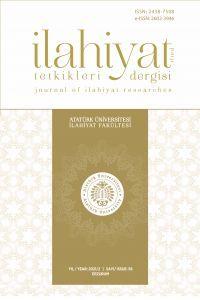Dört Kaynak Hipotezi Karşıtı Olarak John Van Seters ve Tevrat Eleştirisi
As an Opponent of Four Sources Hypothesis John Van Seters and his Pentateuch Criticism
Author(s): Muhammed Ali BağırSubject(s): Jewish Thought and Philosophy, History of Judaism, Biblical studies, History of Religion
Published by: Atatürk Üniversitesi İlahiyat Fakültesi
Keywords: History of Religions; Judaism; Pentateuch; Four Source Hypothesis; John Van Seters; Yahwist Source;
Summary/Abstract: For centuries, the Pentateuch has been believed to be a revelational work written by Moses. This belief, which traditional Judaism holds even today, has begun to be questioned by critical studies in the Western world. In these researches, it was revealed that the Pentateuch is a work written by different people who lived in different times. The peak of these critical researches is The Four Source Hypothesis, which was finalized by Julius Wellhausen. He claimed that the Pentateuch consists of four different sources. This widely accepted view has been seriously challenged by some studies since the 1970s. The subject of this article is the Pentateuch criticism of the Canadian researcher John Van Seters (b. 1935), who opposed the Four Source Hypothesis and suggested that the Pentateuch consists of three basic sources. His most striking claim is that the Yahwist source -one of the sources of the Pentateuch- was written by a historian writer who lived in the Babylonian Exile in the sixth century B.C., taking into account of Deuteronomy, Deuteronomistic History, prophetic books and Ancient Near Eastern narratives. Van Seters’s most striking claim will be emphasized in this study.
Journal: İlahiyat Tetkikleri Dergisi
- Issue Year: 2021
- Issue No: 56
- Page Range: 233-258
- Page Count: 26
- Language: Turkish

